外研九下Module2 Education Unit 3课件
文档属性
| 名称 | 外研九下Module2 Education Unit 3课件 | 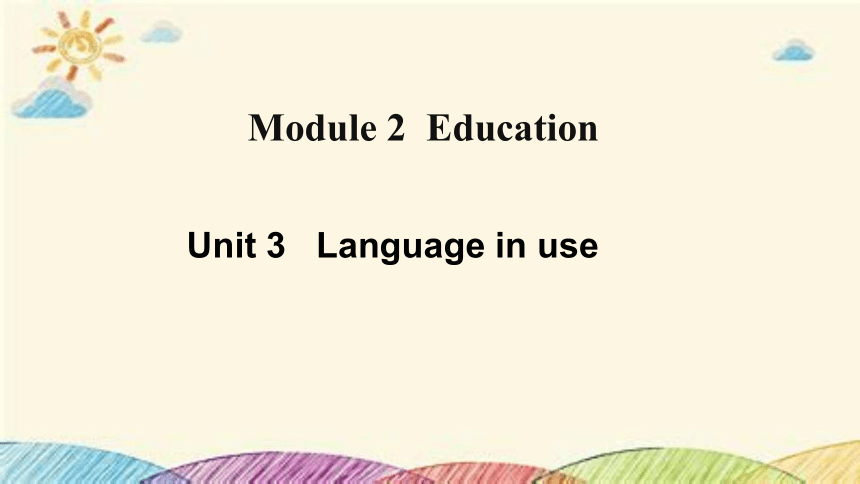 | |
| 格式 | pptx | ||
| 文件大小 | 2.6MB | ||
| 资源类型 | 试卷 | ||
| 版本资源 | 外研版 | ||
| 科目 | 英语 | ||
| 更新时间 | 2024-03-26 21:40:24 | ||
图片预览

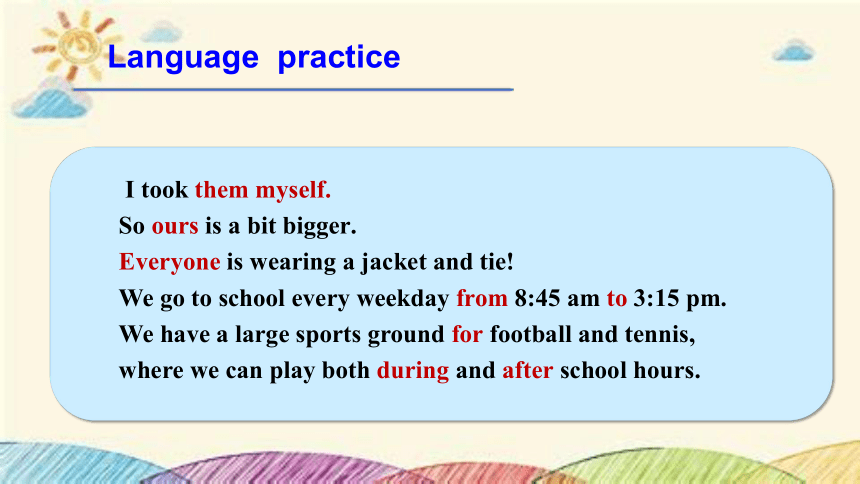
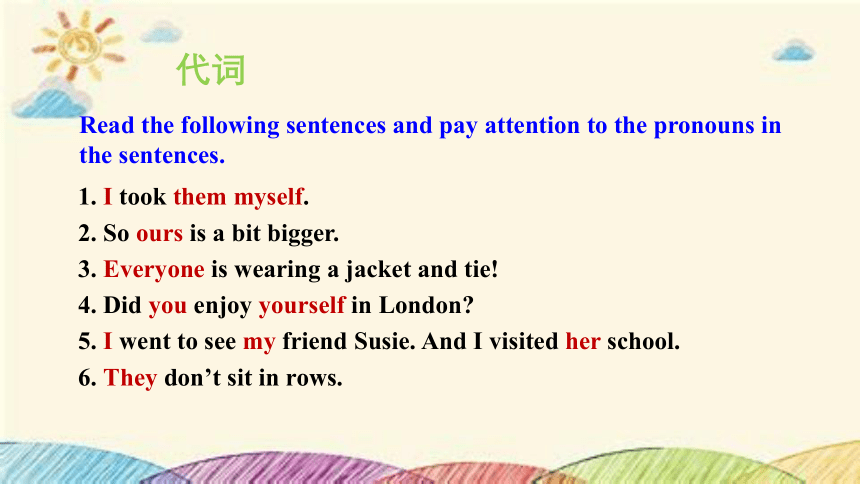
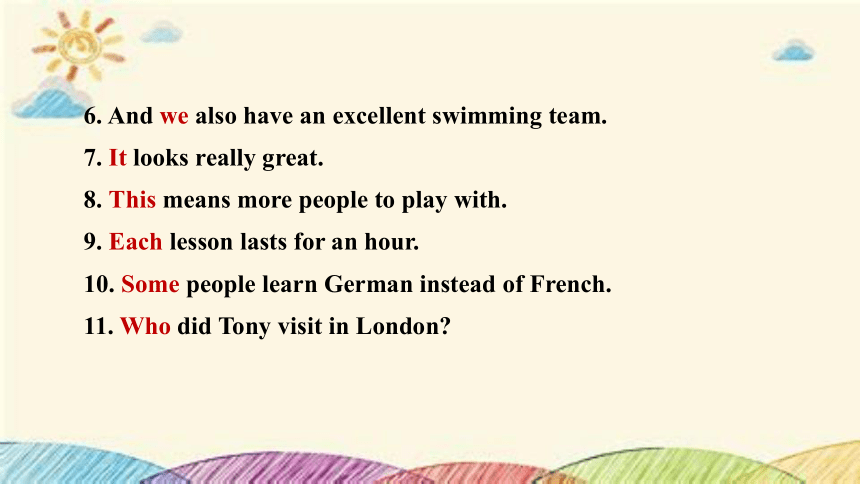
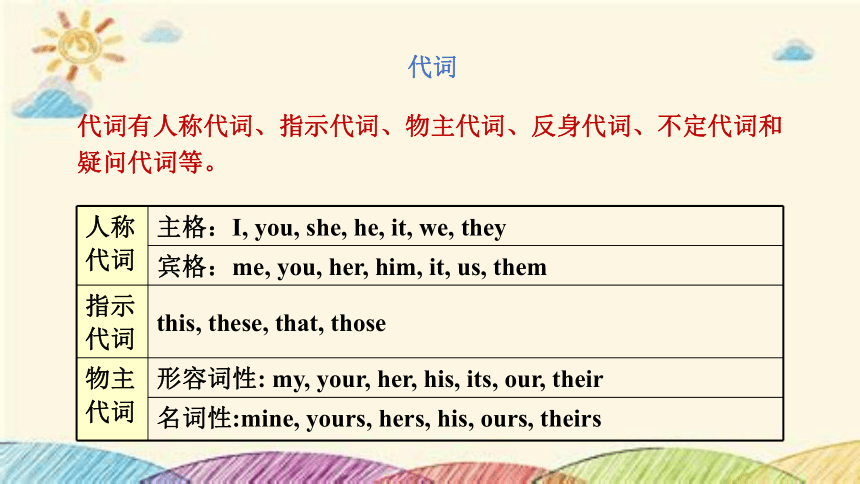
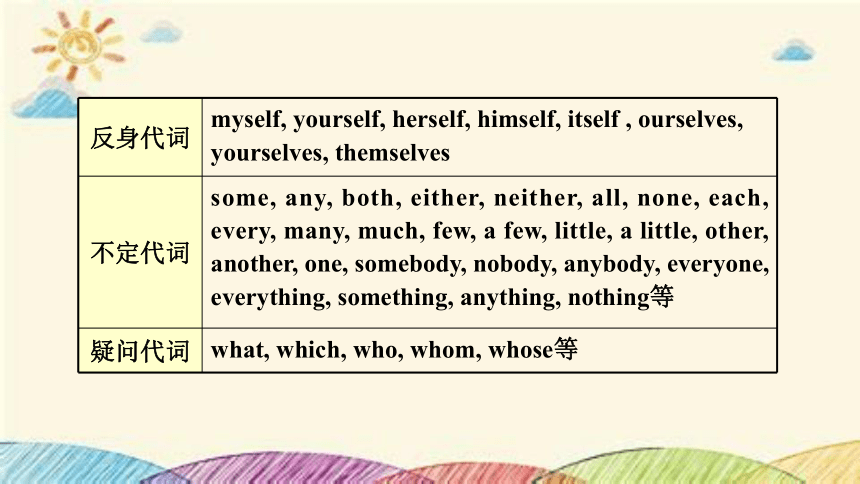
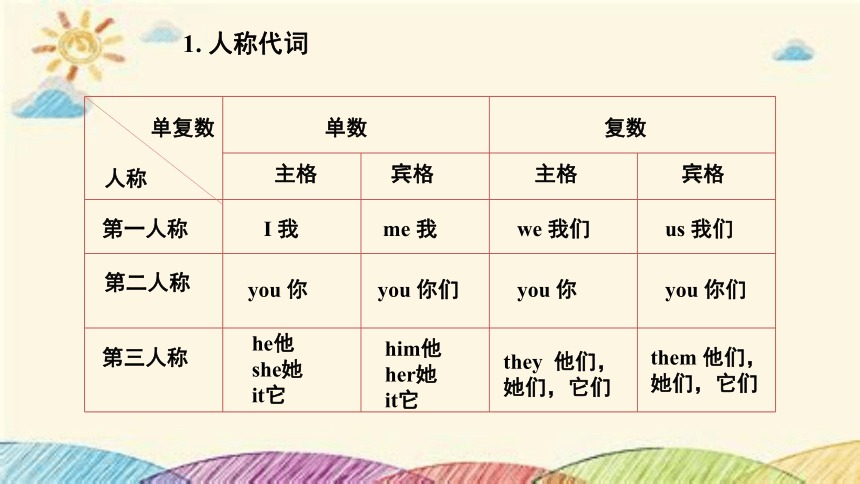
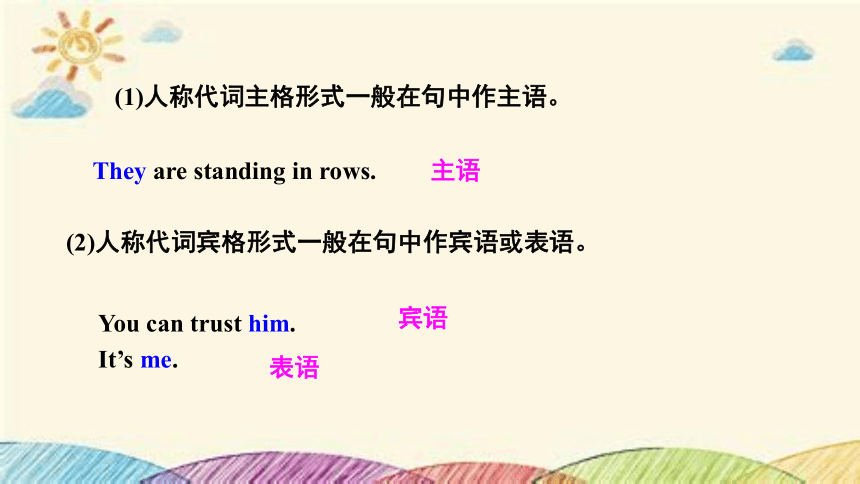
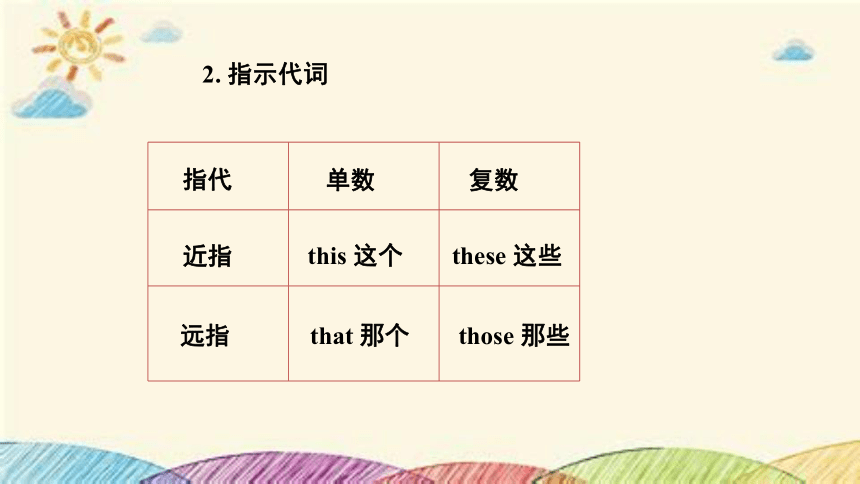
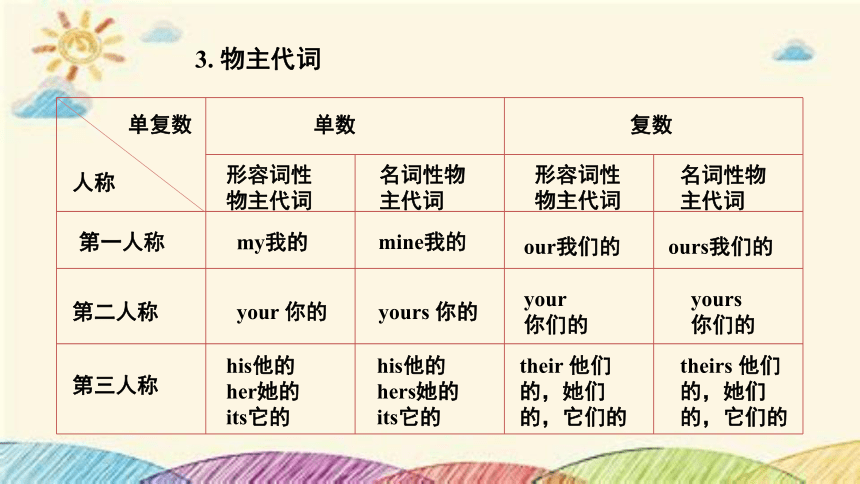
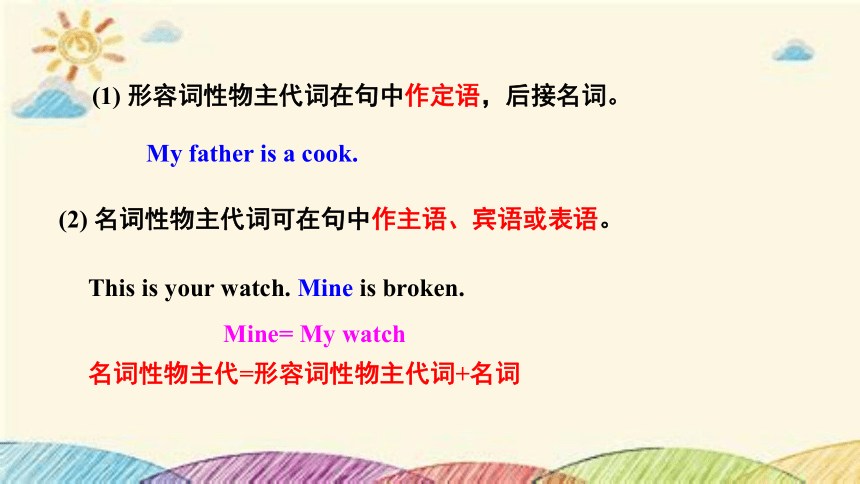
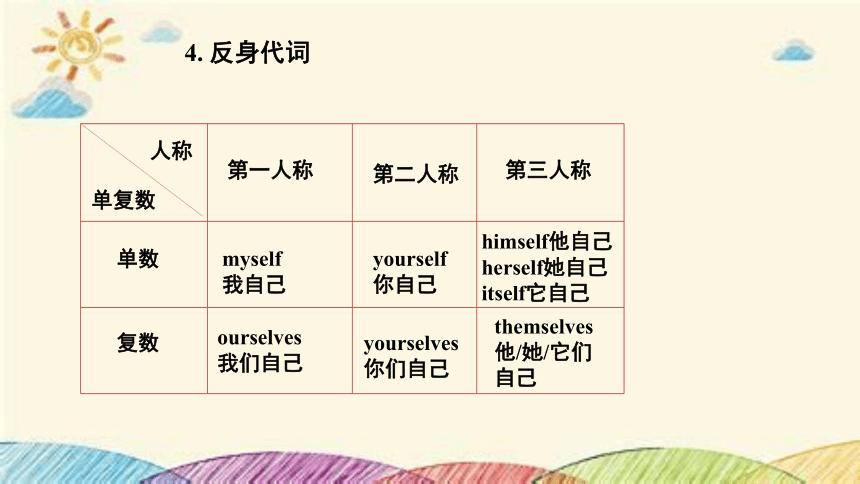
文档简介
(共76张PPT)
Module 2 Education
Unit 3 Language in use
Language practice
I took them myself.
So ours is a bit bigger.
Everyone is wearing a jacket and tie!
We go to school every weekday from 8:45 am to 3:15 pm.
We have a large sports ground for football and tennis, where we can play both during and after school hours.
1. I took them myself.
2. So ours is a bit bigger.
3. Everyone is wearing a jacket and tie!
4. Did you enjoy yourself in London
5. I went to see my friend Susie. And I visited her school.
6. They don’t sit in rows.
Read the following sentences and pay attention to the pronouns in
the sentences.
代词
6. And we also have an excellent swimming team.
7. It looks really great.
8. This means more people to play with.
9. Each lesson lasts for an hour.
10. Some people learn German instead of French.
11. Who did Tony visit in London
代词有人称代词、指示代词、物主代词、反身代词、不定代词和疑问代词等。
人称代词 主格:I, you, she, he, it, we, they
宾格:me, you, her, him, it, us, them
指示代词 this, these, that, those
物主代词 形容词性: my, your, her, his, its, our, their
名词性:mine, yours, hers, his, ours, theirs
代词
反身代词 myself, yourself, herself, himself, itself , ourselves, yourselves, themselves
不定代词 some, any, both, either, neither, all, none, each, every, many, much, few, a few, little, a little, other, another, one, somebody, nobody, anybody, everyone, everything, something, anything, nothing等
疑问代词 what, which, who, whom, whose等
1. 人称代词
单复数
人称
第一人称
第二人称
第三人称
单数
复数
主格
宾格
主格
宾格
I 我
you 你
he他
she她
it它
me 我
you 你们
him他
her她
it它
we 我们
you 你
they 他们,她们,它们
us 我们
you 你们
them 他们,
她们,它们
(1)人称代词主格形式一般在句中作主语。
They are standing in rows.
主语
(2)人称代词宾格形式一般在句中作宾语或表语。
You can trust him.
It’s me.
宾语
表语
2. 指示代词
指代
近指
远指
单数
this 这个
that 那个
these 这些
those 那些
复数
3. 物主代词
人称
单复数
第一人称
第二人称
第三人称
单数
形容词性物主代词
名词性物主代词
形容词性物主代词
名词性物主代词
my我的
your 你的
his他的
her她的
its它的
mine我的
yours 你的
his他的
hers她的
its它的
our我们的
your
你们的
their 他们的,她们
的,它们的
ours我们的
yours
你们的
theirs 他们的,她们
的,它们的
复数
(1) 形容词性物主代词在句中作定语,后接名词。
My father is a cook.
(2) 名词性物主代词可在句中作主语、宾语或表语。
This is your watch. Mine is broken.
Mine= My watch
名词性物主代=形容词性物主代词+名词
4. 反身代词
人称
单复数
单数
复数
第一人称
第二人称
第三人称
myself我自己
ourselves我们自己
yourself
你自己
yourselves
你们自己
himself他自己
herself她自己
itself它自己
themselves
他/她/它们自己
1. some & any
都表示“一些”,可指可数名词和不可数名词。可做主语和宾语。some多用于肯定句,any多用于否定句、疑问句和条件句。
Some of the students can speak German.
一些学生会说德语。
5.不定代词
2. neither & none
都表示否定意思,区别在于:neither表示对两者的否定,而none表示对三者及以上的否定。
① I saw two boys at the door, but neither of them is my brother.
我看见两个男孩在门口,但是他们两个都不是我的弟弟。
②None of the students in my class wants/want to take part in this trip.
我们班没有一个学生想去参加这次旅行。
3. (a) little & (a) few
a little和a few表示肯定的概念,而little和few表示否定的概念。
There is little milk in the glass.玻璃杯里几乎没有牛奶 。
He has many friends; but few are true friends/but only a few are true friends.他有许多朋友,但是没有几个真正的朋友/但是只有几个是真正的朋友。
此外,(a) little用于修饰不可数名词,而(a) few用于修饰可
数名词。
4. both & and
both表示“两者都”,而all表示“全体,一切”,指三者及以上,all还可以指不可数的事物。
All of the boys went to the cinema yesterday evening.
昨天晚上所有男孩都去看电影了。
—Which of the two shirts do you like 这两件衬衫你喜欢哪一件?
—I like both.都喜欢。
both和all还可以用于主语后。
e.g. We both/ all passed the exam.我们两个都/都通过了考试。
5. each & either
都表示“每一个”,each可以表示两者或两者以上中的“每一个”。而either只能表示两者中的“每一个”。
e.g. Each of us/ We each got a beautiful
card on that special day.
—Which of the two shirts do you want
—Either will do.
注意: either表示二选一,表示两者都要用both。
6. 疑问代词
疑问代词用于构成特殊疑问句,包括what, which, who, whom, whose等,代词的选择根据句意要求而定。
e.g. When do you hear a bell at school
What are English schools like
How many pupils are there in a class in England
1. ______ (I) took them _______ (I).
2. So _______ (we) is a bit bigger.
3. _________ is wearing a jacket and tie!
4. Did you enjoy __________ in London
5. _______ (I) went to see _______ (I) friend Susie. And ______ (I) visited _______ school.
6. _______ (they) don’t sit in rows.
I
myself
ours
Everyone
yourself
I
my
I
her
They
Excises
7. And ______ (we) also have an excellent swimming team.
8. ______ (it) looks really great.
9. _______ means more people to play with.
10. _______ lesson lasts for an hour.
11. _______ people learn German instead of French.
12. _______ did Tony visit in London
we
It
This
Each
Some
Who
Underline the correct words.
Anna: Hi, Bob. How did your exams go last term
Bob: Great! I got good marks in (1) both/ each maths and geography. What about you
Anna: I did really well in English. That’s (2) anything/ something I’ve always enjoyed. My marks in history and art weren’t so good because (3) none/ neither is my favorite subject. What will you study this term
Bob: I’ve still got (4) a few/ few days before I have to decide.
01
课堂活动
I’m going to speak to (5) both/ all my teachers and
ask for their advice.
Anna: The teachers say that we must decide for (6) themselves/ ourselves and that (7) none/ neither of them can tell us what to do.
Bob: But I have to get (8) some/ any information because there are so (9) much/ many subjects and it’s very hard to choose.
Complete the passage with the words and expression in the box.
both each other His mine myself
A good teacher is someone who is helpful and kind, like my history teacher, Mr. Miller. (1) knowledge of the subject is excellent. Because of him, I love history and even read history books by (2) after the lessons.
A friend of (3) called Mark also loves this subject and sometimes we lend (4) _________ books or DVDs about history. I like reading (5) Western and Chinese history books, but I think Chinese history is my favorite subject.
His
myself
mine
each other
both
01
Complete the sentences with the correct form of the words in the box.
he her him himself our she their themselves they us we
1.John’s homework is too difficult. ____ is not able to do it _______,
so I’m going to help ____ with it.
2. Some people do not have time to wash _____ pets __________, so
_____ pay someone to do it at the pet shop.
3. —Jane is doing a project about family history. ____has asked us to
give ____ some of ____ photos that were taken when we were young.
Have ____ got any, Betty
—Yes, there is a photo of ____with all the children in our family.
He
himself
him
their
themselves
they
She
her
our
we
us
03
1. We go to school every weekday from 8:45 am to 3:15 pm.
2. We have a large sports ground for football and tennis, where we can play both during and after school hours.
3. I’ve been at River School, London, since I was eleven.
4. River School is a secondary school, about twenty minutes away from my home by bike.
Read the following sentences and pay attention to the prepositions in the sentences.
5. There, our head teacher tells us news about the school.
6. During the school year there are usually visits to museums and to
camps for activities such as climbing and walking in the country.
7. In the afternoon, we have two more lessons before school finishes.
8. It’s lucky we don’t have exams in every subject.
1.We go ___ school every weekday______8:45 am ___3:15 pm.
2. We have a large sports ground _____football and tennis,
where we can play both _______ and _____ school hours.
3. I’ve been ____River School, London, since I was eleven.
4. River School is a secondary school, _______ twenty minutes away ______ my home ____ bike.
to
from
to
for
during
after
at
about
from
by
5. There, our head teacher tells us news _______ the school.
6. _______ the school year there are usually visits _______
museums and _______ camps _______ activities such as
climbing and walking _____ the country.
7. _____ the afternoon, we have two more lessons before
school finishes.
8. It’s lucky we don’t have exams _____ every subject.
about
During
to
to
for
in
In
in
介词
介词
表示时间
at, in, on, before, after, by, until, till, for, during, through, from, since…
表示场所
at, in, on, under, by, near, between, around…
表示方向
into, out of, along, across…
表示方式、手段
by, with, on…
表示材料
of, from, in…
其他
of, from, as…
表示时间的介词
1. 表示年、月、日、时刻等用 at, in, on
2. 表示时间的前后用 before, after
3. 表示期限等用 by, until, till
4. 表示期间等用 for, during, through
5. 表示时间的起点等用 from, since
6. 表示时间的经过等用 in, within
at & on & in
at用于表示时刻、时间的某一点。
at lunch 午餐时 at breakfast早餐时
at night 在夜间 at first 起初
at times 偶尔,有时 at the same time同时
e.g. We usually have lunch at noon/at twelve.
我们通常中午吃午饭(十二点吃午饭)。
注意:
表示时间的名词前有this, last, next,every等修饰时,其前面不加介词。
this morning 今天早上 last Monday 上周一
every week 每周
on用于表示某天,某一天的上、下午(指具体的某一时,一律用on)。
on Monday 在周一 on June 6 在6月6日
on Tuesday morning 在星期二早晨
on May 4, 2003 在2003年5月4日
on Children’s Day 在儿童节那天
on the night of July (the) first 在七月一日夜晚
e.g. We didn’t listen to the lecture on Wednesday afternoon.
周三下午我们没去听演讲。
in用于表示周、月、季节、年和泛指的上午、下午、晚上(指在一段时间内)。
in the week 在这周 in May 在五月
in the holiday 在假期中 in summer 在夏季
in September, 1995 在1995年9月
in the morning 在上午
in the 21st century 在二十一世纪
in time 及时 in an hour 一个小时后
e.g. People go skating in winter. 人们冬天去滑冰。
Do they work in the day time or at night
他们白天工作还是晚上工作?
before 在……之前
e.g. Wash your hands before dinner.
(before作介词) 吃饭前请洗手。
He will call me before he leaves here/before ten o’clock.
(前一个before作连词;后一个before作介词) 他离开这儿之前/
十点之前,将给我打电话。
before & after
两者既可以作介词又可以作连词。
after 在……之后
e.g. Let’s sing some songs after school.
(after作介词)放学后咱们唱歌吧!
Please close the door after you leave the room.
(after作连词)离开房间后请关门。
by 在……前(时间);截止(到)……
by the end of…在……底(之前)
by then 到那时
by the time + 从句 在……之前
e.g. How many English books had you read by the end of last year
到去年年底你看过多少本英文书?
She had left by the time I arrived.
我到时(之前)她已经走了。
by & until/till
until/till 直到……为止(时间)
e.g. We didn’t begin to watch TV until/till nine o’clock.
一直到九点,我们才开始看电视。
I will wait for him until he comes here.
我将在这儿一直等到他来。
for 达……之久(表示经过了多少时间)可以和一般现在时、过去时、将来时连用,但经常和完成时连用。
e.g. He has lived here for 20 years.
他在这儿已经住了二十年了。
We will stay in the city for two days.
我们要在这座城市待两天。
for & during & through
during 在……期间
e.g. They are going to have a good rest during the summer holidays.
暑假期间他们打算好好休息一下。
through 一直……(从开始到结束)
e.g. They played the cards through the night.
He stayed in London through the winter.
比较:for和during。for之后大多跟表示时间、具体天数等的数字
名词。而during后决不能跟表数字的名词。
from 从……起(时间)
表示“从……开始”时,一般都是用词组from…to…
而单纯表示确切的“从几点开始”时用at。
e.g. The meeting will be held from eight to ten.
这个会议将从8点开到10点。
The meeting will be held at eight.
会议将从八点钟开始。
from & since
since 自从……以来 (表示从以前某时一直到现在仍在继续)
e.g. I have been sick since yesterday.
我从昨天起就病了。(强调一直病到现在)
The doctor has saved a lot of lives since he became a
doctor. (since作连词,引导时间状语从句)
这个医生自从当医生以来已经拯救了许多人的生命。
表示场所的介词
表示方向的介词
at, in, on, under, by, near, between, around, opposite
into, out of, along, across, through, up, past
表示场所、方向的介词
at在某地(表示比较狭窄的场所)
at school 上学 at home 在家
at Baker Street 在贝克街2号
stand at the door 站在门边
at the bottom/back/end/head of
e.g. I’ll meet him at the Beijing railway station.
我将去北京站接他。
at & in
in 在某地(表示比较宽敞的场所)
in Beijing 在北京 in the world在世界上
in the bed 躺在床上 in China 在中国
in a book/newspaper 在书上/报纸上
e.g. His brother is in prison. He was arrested 2 years ago.
他哥哥两年前被捕的,现在他在监狱中服刑。
Mike works in the prison. 迈克在监狱工作。
She was born in China. 她出生于中国。
on 在……上面,有接触面。
on the desk 在桌子上面
on the map 在地图上
e.g. There are two maps on the wall. 墙上有两张地图。
on 在……靠近……的地方
on the right 在右边 on the river在河边
on the pavement 在人行道上
on & above & over & under & below
above 在……上方
e.g. Our plane flew above the clouds.
我们的飞机在云端上飞行。
over 在……正上方,是under的反义词
e.g. There is a light over Li Ming.
李明的正上方有一盏灯。
A few birds were flying over the sea.
有几只鸟在海上飞。
under 在……下面;在……之内
under the table 桌子下面
under the jacket 在夹克内
e.g. The dog is under the table. 这只狗在桌子下面。
below 在……下方(不一定是正下方)
正下方是under,below是above的反义词。
e.g. There are a lot of fishes below the surface
of the water. 水下面有许多的鱼。
near近的,不远的 near=not far,是far的反义词。
near还可以指时间,如:
in the near future 在不久的将来
e.g. Is there a bus stop near here
这儿附近有公共汽车站吗?
by 在……旁边,距离比near要近
by the window 在窗户边 by me在我旁边
e.g. The boy is standing by the window.那个男孩站在窗边。
near & by
between 在两者之间
e.g. My teacher is sitting between Tom and
Mike. 我们的老师正坐在汤姆和麦克之间。
What’s the difference between A and B?
among 在三者或更多的之中
e.g. There is a beautiful house among the trees.
在树林之中有一间漂亮的房子。
He is very popular among the students.
他在学生之中很受欢迎。
between & among & around
around环绕,在……周围,在……四周
e.g. We sat around the table.
我们在桌子四周坐下来。
The earth moves around the sun.
地球围绕太阳转。
in (the) front of 在……的前面(前部)
e.g. There is a tree in front of the house.
在房屋前面有一棵树。
There is a big desk for the teacher in the front of the classroom.
在教室前部有一张大讲桌。
behind 在……后面,是in front of 的反义词
e.g. There is a tree behind my house.
我家房子后面有一棵树。
in front of & behind & opposite
opposite 在……对面
e.g. Our school is opposite a university.
我们学校在一所大学的对面。
He stood opposite me.
他站在我对面。
in 在……之内,用于表示静止的位置
e.g. The students are in the classroom.学生们在教室里。
into进入,用于表示有特定终点的运动的方向。通常用于表示动作的动词之后。如:go, come, walk, run等。
e.g. The students run into the classroom.学生们跑进教室。
He jumped into the water. 他跳入水中。
in & into & out of & up
out of和into一样,也表示有一定的运动方向
e.g. The students rushed out of the room.学生们冲出房间。
up 移动
e.g. The children climbed up the tree.
孩子们爬上了树。
along 沿着
e.g. I was walking along the river when it began to rain.
我正沿着河边散步,突然下起雨来了。
across 横过
e.g. I often swim across the river.我常游泳横渡这条河。
along & across & past & through
past 经过
e.g. Every day he runs past the city hall.
他每天跑步经过市政府。
through 贯穿,通过
e.g. The sun shone through the clouds.
阳光穿过云层照射下来。
The river was through the city.
这条河穿过这个城市。
to到达……地点(目的地)或方向
e.g. He came to Japan in 1980. 他1980年来到日本。
for表示目的地,“向……”for表目的时,一般都是和固定动词搭配。
leave for 动身去…… start for 出发去……
e.g. I will leave for America next week.
下周我将动身去美国。
from 从……地点起
e.g. It’s about ten minutes’ walk from here to
the cinema.从这儿到电影院大约步行十分钟。
to & from & for
注意:表示搭乘交通工具时,用by时不用冠词,用in时要用冠词。
请比较:
表示方式、手段的介词
By 用 某种方式,多用于交通。如:
by bus 乘公共汽车
by e-mail 通过电子邮件
e.g. I went there by bus/in a bus.
我是坐公共汽车去的那儿。
e.g. He broke the window with a stone.
他用石头把玻璃砸坏了。
注意:with表示用某种工具时,必须用冠词或物主代词。
表示“用某种工具”。如:
on 表示“以......方式”,多用于固定词组。
e.g. They talked on the telephone.
他们通过电话进行交谈。
She learns English on the radio/on TV.
她通过收音机/电视学英语。
This box is made of paper.这个盒子是纸做的。
表示材料的介词
from成品已看不出原料。如:
of成品仍可看出原料。如:
Wine is made from grapes.葡 萄 酒是葡萄酿成的。
in表示用某种材料或语言。如:
Please fill in the form in pencil first.
请先用铅笔填写这个表格。
They talk in English. 他们用英语交谈。
in指用材料,不用冠词;而with指用工具,要用冠词。请比较:
draw in pencil /draw with a pencil
of (属于)……的;表示……的数量或种类
其他介词
e.g. I’m from Nanjing. 我来自南京。
I have got a letter from my friend.
我收到了我朋友的一封信。
from 来自(某地、某人);以……起始(时间或地点)
e.g. This is a map of China. 这是一张中国地图。
Will you please give me a cup of tea
请给我一杯茶好吗?
He dressed as a policeman. 他装扮成警察。
1.as 表示好像。如:
2.表示作为当作。如:
3.当某人是某身份时。如:
I found a job as a guide.我找到了一份导游的工作。
As a child, she was sent to abroad. 她小时候被送到国外。
as
Complete the passage with the words in the box. You need to use one word more than once.
at for in on
The school cinema shows lots of foreign films. Next week (1)
Friday and Sunday it is showing a French film called Never Say
Goodbye. The story is set (2) ____ Paris (3) ____ the 1960s. The film
lasts two hours and fifteen minutes and starts (4) ____ 6:30 and 9:30
(5) ____ the evenings. Tickets are £5, but there is a special half-price
ticket (6) ____ students from our school. Please bring your student
card if you want a cheap ticket.
on
in
in
at
in
for
04
Complete the passage so they are true for you.
1.I study _____subjects: English, _______________________
_________________________________________________.
2.I don’t study __________.
3.I take exams in ______________________, __________________
but I don’t take exams in ______.
4.My favorite sport is ___________ because _______________.
5. I usually play sports on _____________.
6.After-school activities, such as __________________ are
very popular at our school.
ten
chemistry, history, geography, PE, IT, and music.
moths, Chinese, physics,
biology
Chinese, maths, physics
chemistry and English
PE
football
it’s exciting
Sundays
dancing and sports
05
Listen and answer the questions.
1.Where does Kate want to go on holiday next year
Kate wants to go to Germany on holiday next year.
2. What game has Pete played since primary school
Pete has played chess since primary school.
3. When do Kate and Pete have sports practice
Kate and Pete have sports practice on Wednesday afternoon.
06
Listen again and complete the table.
School year Special subject Club Sport Plan for next year
Kate
Pete
9
German
language
club
tennis
holiday in Germany
10
Geography
language
club,
chess
club
foot-ball
win all my
chess match
07
Read the passage and say where you think it comes from.
a) A dictionary. b) A school website. c) A storybook.
08
1. The school day begins at 9 am. Class teachers meet the class and check who is present or absent at the start of the day. All the classes meet once a week on Fridays. The head teacher speaks to the whole school. Morning lessons begin at 9:20 am. There are three forty -minute lessons, with a twenty -minute break in between. The lunch break is from 12 pm to 1 pm. Afternoon lessons begin at 1 pm and the school day finishes at 3 pm.
2. All the students study and take exams in math, science and English. They also choose one subject from history, geography, art, French and Chinese. All the students take PE lessons, but no exams are required.
3. The chess, music, language and theatre clubs often have meetings after school. Students may join as many clubs as they like, but they must join at least one.
4. After school sports practice and matches take place on Wednesday afternoons and Saturday mornings. The school has a good record in sports. Last year, we were the best in football and tennis, and some students won prizes for swimming and running.
Now match the headings with the paragraphs.
a) Clubs b) School hours c) Sports d) Subjects
3
1
4
2
Read the passage again and check the true sentences.
1. The head teacher speaks to the whole school on Fridays.
2. The lunch break is less than one hour.
3. Students take exams in all the subjects they study.
4. Students can join more than one club.
√
√
09
No teachers needed?
When it comes to learning, the environment has a big part to play. This has been shown in a long-term study by Professor Mitra from India. He set up computers in a village in India where children could not speak English. They did not know what a computer looked like or what the Internet was.to everyone’s surprise, children taught themselves how to use the machines in a very short period of time. This suggests that children can learn fast with little help. Professor Mitra thinks this could change schools. He is now working on so-called SOLEs (Self-Organised Learning Environments). He explains that SOLEs include at least a computer and a bench big enough for four pupils. SOLEs have also been tested in some other countries such as the UK and Italy, with encouraging results.
Make a leaflet about your school for new students.
Make a leaflet to introduce your school to new students.
Use the sentences in Activity 10.
Draw pictures and make designs where necessary.
11
Ⅰ.根据句意用适当的介词填空
1.These days I am busy my project on pollution.
2.My teacher was very angry me because I was late
school again.
3.Will you invite any friends your thirteenth birthday party
4.How long has he worked an English teacher
5.My uncle arrived the train station the morning of May 3.
with
with
for
to
as
at
on
4
课堂训练
Ⅱ.用方框中所给单词的适当形式填空
win ,neither ,none ,both , lend
1.I did well in English and Chinese last term.
2.—What would you like , tea or coffee
— .I’d just like a glass of water.
3.—Can I use your pen , Kate
—OK . Here you are . But you can’t it to others.
4.I tried several skirts on , but of them looked good.
5 . Good news ! We first prize in the singing competition.
both
Neither
lend
none
won
Module 2 Education
Unit 3 Language in use
Language practice
I took them myself.
So ours is a bit bigger.
Everyone is wearing a jacket and tie!
We go to school every weekday from 8:45 am to 3:15 pm.
We have a large sports ground for football and tennis, where we can play both during and after school hours.
1. I took them myself.
2. So ours is a bit bigger.
3. Everyone is wearing a jacket and tie!
4. Did you enjoy yourself in London
5. I went to see my friend Susie. And I visited her school.
6. They don’t sit in rows.
Read the following sentences and pay attention to the pronouns in
the sentences.
代词
6. And we also have an excellent swimming team.
7. It looks really great.
8. This means more people to play with.
9. Each lesson lasts for an hour.
10. Some people learn German instead of French.
11. Who did Tony visit in London
代词有人称代词、指示代词、物主代词、反身代词、不定代词和疑问代词等。
人称代词 主格:I, you, she, he, it, we, they
宾格:me, you, her, him, it, us, them
指示代词 this, these, that, those
物主代词 形容词性: my, your, her, his, its, our, their
名词性:mine, yours, hers, his, ours, theirs
代词
反身代词 myself, yourself, herself, himself, itself , ourselves, yourselves, themselves
不定代词 some, any, both, either, neither, all, none, each, every, many, much, few, a few, little, a little, other, another, one, somebody, nobody, anybody, everyone, everything, something, anything, nothing等
疑问代词 what, which, who, whom, whose等
1. 人称代词
单复数
人称
第一人称
第二人称
第三人称
单数
复数
主格
宾格
主格
宾格
I 我
you 你
he他
she她
it它
me 我
you 你们
him他
her她
it它
we 我们
you 你
they 他们,她们,它们
us 我们
you 你们
them 他们,
她们,它们
(1)人称代词主格形式一般在句中作主语。
They are standing in rows.
主语
(2)人称代词宾格形式一般在句中作宾语或表语。
You can trust him.
It’s me.
宾语
表语
2. 指示代词
指代
近指
远指
单数
this 这个
that 那个
these 这些
those 那些
复数
3. 物主代词
人称
单复数
第一人称
第二人称
第三人称
单数
形容词性物主代词
名词性物主代词
形容词性物主代词
名词性物主代词
my我的
your 你的
his他的
her她的
its它的
mine我的
yours 你的
his他的
hers她的
its它的
our我们的
your
你们的
their 他们的,她们
的,它们的
ours我们的
yours
你们的
theirs 他们的,她们
的,它们的
复数
(1) 形容词性物主代词在句中作定语,后接名词。
My father is a cook.
(2) 名词性物主代词可在句中作主语、宾语或表语。
This is your watch. Mine is broken.
Mine= My watch
名词性物主代=形容词性物主代词+名词
4. 反身代词
人称
单复数
单数
复数
第一人称
第二人称
第三人称
myself我自己
ourselves我们自己
yourself
你自己
yourselves
你们自己
himself他自己
herself她自己
itself它自己
themselves
他/她/它们自己
1. some & any
都表示“一些”,可指可数名词和不可数名词。可做主语和宾语。some多用于肯定句,any多用于否定句、疑问句和条件句。
Some of the students can speak German.
一些学生会说德语。
5.不定代词
2. neither & none
都表示否定意思,区别在于:neither表示对两者的否定,而none表示对三者及以上的否定。
① I saw two boys at the door, but neither of them is my brother.
我看见两个男孩在门口,但是他们两个都不是我的弟弟。
②None of the students in my class wants/want to take part in this trip.
我们班没有一个学生想去参加这次旅行。
3. (a) little & (a) few
a little和a few表示肯定的概念,而little和few表示否定的概念。
There is little milk in the glass.玻璃杯里几乎没有牛奶 。
He has many friends; but few are true friends/but only a few are true friends.他有许多朋友,但是没有几个真正的朋友/但是只有几个是真正的朋友。
此外,(a) little用于修饰不可数名词,而(a) few用于修饰可
数名词。
4. both & and
both表示“两者都”,而all表示“全体,一切”,指三者及以上,all还可以指不可数的事物。
All of the boys went to the cinema yesterday evening.
昨天晚上所有男孩都去看电影了。
—Which of the two shirts do you like 这两件衬衫你喜欢哪一件?
—I like both.都喜欢。
both和all还可以用于主语后。
e.g. We both/ all passed the exam.我们两个都/都通过了考试。
5. each & either
都表示“每一个”,each可以表示两者或两者以上中的“每一个”。而either只能表示两者中的“每一个”。
e.g. Each of us/ We each got a beautiful
card on that special day.
—Which of the two shirts do you want
—Either will do.
注意: either表示二选一,表示两者都要用both。
6. 疑问代词
疑问代词用于构成特殊疑问句,包括what, which, who, whom, whose等,代词的选择根据句意要求而定。
e.g. When do you hear a bell at school
What are English schools like
How many pupils are there in a class in England
1. ______ (I) took them _______ (I).
2. So _______ (we) is a bit bigger.
3. _________ is wearing a jacket and tie!
4. Did you enjoy __________ in London
5. _______ (I) went to see _______ (I) friend Susie. And ______ (I) visited _______ school.
6. _______ (they) don’t sit in rows.
I
myself
ours
Everyone
yourself
I
my
I
her
They
Excises
7. And ______ (we) also have an excellent swimming team.
8. ______ (it) looks really great.
9. _______ means more people to play with.
10. _______ lesson lasts for an hour.
11. _______ people learn German instead of French.
12. _______ did Tony visit in London
we
It
This
Each
Some
Who
Underline the correct words.
Anna: Hi, Bob. How did your exams go last term
Bob: Great! I got good marks in (1) both/ each maths and geography. What about you
Anna: I did really well in English. That’s (2) anything/ something I’ve always enjoyed. My marks in history and art weren’t so good because (3) none/ neither is my favorite subject. What will you study this term
Bob: I’ve still got (4) a few/ few days before I have to decide.
01
课堂活动
I’m going to speak to (5) both/ all my teachers and
ask for their advice.
Anna: The teachers say that we must decide for (6) themselves/ ourselves and that (7) none/ neither of them can tell us what to do.
Bob: But I have to get (8) some/ any information because there are so (9) much/ many subjects and it’s very hard to choose.
Complete the passage with the words and expression in the box.
both each other His mine myself
A good teacher is someone who is helpful and kind, like my history teacher, Mr. Miller. (1) knowledge of the subject is excellent. Because of him, I love history and even read history books by (2) after the lessons.
A friend of (3) called Mark also loves this subject and sometimes we lend (4) _________ books or DVDs about history. I like reading (5) Western and Chinese history books, but I think Chinese history is my favorite subject.
His
myself
mine
each other
both
01
Complete the sentences with the correct form of the words in the box.
he her him himself our she their themselves they us we
1.John’s homework is too difficult. ____ is not able to do it _______,
so I’m going to help ____ with it.
2. Some people do not have time to wash _____ pets __________, so
_____ pay someone to do it at the pet shop.
3. —Jane is doing a project about family history. ____has asked us to
give ____ some of ____ photos that were taken when we were young.
Have ____ got any, Betty
—Yes, there is a photo of ____with all the children in our family.
He
himself
him
their
themselves
they
She
her
our
we
us
03
1. We go to school every weekday from 8:45 am to 3:15 pm.
2. We have a large sports ground for football and tennis, where we can play both during and after school hours.
3. I’ve been at River School, London, since I was eleven.
4. River School is a secondary school, about twenty minutes away from my home by bike.
Read the following sentences and pay attention to the prepositions in the sentences.
5. There, our head teacher tells us news about the school.
6. During the school year there are usually visits to museums and to
camps for activities such as climbing and walking in the country.
7. In the afternoon, we have two more lessons before school finishes.
8. It’s lucky we don’t have exams in every subject.
1.We go ___ school every weekday______8:45 am ___3:15 pm.
2. We have a large sports ground _____football and tennis,
where we can play both _______ and _____ school hours.
3. I’ve been ____River School, London, since I was eleven.
4. River School is a secondary school, _______ twenty minutes away ______ my home ____ bike.
to
from
to
for
during
after
at
about
from
by
5. There, our head teacher tells us news _______ the school.
6. _______ the school year there are usually visits _______
museums and _______ camps _______ activities such as
climbing and walking _____ the country.
7. _____ the afternoon, we have two more lessons before
school finishes.
8. It’s lucky we don’t have exams _____ every subject.
about
During
to
to
for
in
In
in
介词
介词
表示时间
at, in, on, before, after, by, until, till, for, during, through, from, since…
表示场所
at, in, on, under, by, near, between, around…
表示方向
into, out of, along, across…
表示方式、手段
by, with, on…
表示材料
of, from, in…
其他
of, from, as…
表示时间的介词
1. 表示年、月、日、时刻等用 at, in, on
2. 表示时间的前后用 before, after
3. 表示期限等用 by, until, till
4. 表示期间等用 for, during, through
5. 表示时间的起点等用 from, since
6. 表示时间的经过等用 in, within
at & on & in
at用于表示时刻、时间的某一点。
at lunch 午餐时 at breakfast早餐时
at night 在夜间 at first 起初
at times 偶尔,有时 at the same time同时
e.g. We usually have lunch at noon/at twelve.
我们通常中午吃午饭(十二点吃午饭)。
注意:
表示时间的名词前有this, last, next,every等修饰时,其前面不加介词。
this morning 今天早上 last Monday 上周一
every week 每周
on用于表示某天,某一天的上、下午(指具体的某一时,一律用on)。
on Monday 在周一 on June 6 在6月6日
on Tuesday morning 在星期二早晨
on May 4, 2003 在2003年5月4日
on Children’s Day 在儿童节那天
on the night of July (the) first 在七月一日夜晚
e.g. We didn’t listen to the lecture on Wednesday afternoon.
周三下午我们没去听演讲。
in用于表示周、月、季节、年和泛指的上午、下午、晚上(指在一段时间内)。
in the week 在这周 in May 在五月
in the holiday 在假期中 in summer 在夏季
in September, 1995 在1995年9月
in the morning 在上午
in the 21st century 在二十一世纪
in time 及时 in an hour 一个小时后
e.g. People go skating in winter. 人们冬天去滑冰。
Do they work in the day time or at night
他们白天工作还是晚上工作?
before 在……之前
e.g. Wash your hands before dinner.
(before作介词) 吃饭前请洗手。
He will call me before he leaves here/before ten o’clock.
(前一个before作连词;后一个before作介词) 他离开这儿之前/
十点之前,将给我打电话。
before & after
两者既可以作介词又可以作连词。
after 在……之后
e.g. Let’s sing some songs after school.
(after作介词)放学后咱们唱歌吧!
Please close the door after you leave the room.
(after作连词)离开房间后请关门。
by 在……前(时间);截止(到)……
by the end of…在……底(之前)
by then 到那时
by the time + 从句 在……之前
e.g. How many English books had you read by the end of last year
到去年年底你看过多少本英文书?
She had left by the time I arrived.
我到时(之前)她已经走了。
by & until/till
until/till 直到……为止(时间)
e.g. We didn’t begin to watch TV until/till nine o’clock.
一直到九点,我们才开始看电视。
I will wait for him until he comes here.
我将在这儿一直等到他来。
for 达……之久(表示经过了多少时间)可以和一般现在时、过去时、将来时连用,但经常和完成时连用。
e.g. He has lived here for 20 years.
他在这儿已经住了二十年了。
We will stay in the city for two days.
我们要在这座城市待两天。
for & during & through
during 在……期间
e.g. They are going to have a good rest during the summer holidays.
暑假期间他们打算好好休息一下。
through 一直……(从开始到结束)
e.g. They played the cards through the night.
He stayed in London through the winter.
比较:for和during。for之后大多跟表示时间、具体天数等的数字
名词。而during后决不能跟表数字的名词。
from 从……起(时间)
表示“从……开始”时,一般都是用词组from…to…
而单纯表示确切的“从几点开始”时用at。
e.g. The meeting will be held from eight to ten.
这个会议将从8点开到10点。
The meeting will be held at eight.
会议将从八点钟开始。
from & since
since 自从……以来 (表示从以前某时一直到现在仍在继续)
e.g. I have been sick since yesterday.
我从昨天起就病了。(强调一直病到现在)
The doctor has saved a lot of lives since he became a
doctor. (since作连词,引导时间状语从句)
这个医生自从当医生以来已经拯救了许多人的生命。
表示场所的介词
表示方向的介词
at, in, on, under, by, near, between, around, opposite
into, out of, along, across, through, up, past
表示场所、方向的介词
at在某地(表示比较狭窄的场所)
at school 上学 at home 在家
at Baker Street 在贝克街2号
stand at the door 站在门边
at the bottom/back/end/head of
e.g. I’ll meet him at the Beijing railway station.
我将去北京站接他。
at & in
in 在某地(表示比较宽敞的场所)
in Beijing 在北京 in the world在世界上
in the bed 躺在床上 in China 在中国
in a book/newspaper 在书上/报纸上
e.g. His brother is in prison. He was arrested 2 years ago.
他哥哥两年前被捕的,现在他在监狱中服刑。
Mike works in the prison. 迈克在监狱工作。
She was born in China. 她出生于中国。
on 在……上面,有接触面。
on the desk 在桌子上面
on the map 在地图上
e.g. There are two maps on the wall. 墙上有两张地图。
on 在……靠近……的地方
on the right 在右边 on the river在河边
on the pavement 在人行道上
on & above & over & under & below
above 在……上方
e.g. Our plane flew above the clouds.
我们的飞机在云端上飞行。
over 在……正上方,是under的反义词
e.g. There is a light over Li Ming.
李明的正上方有一盏灯。
A few birds were flying over the sea.
有几只鸟在海上飞。
under 在……下面;在……之内
under the table 桌子下面
under the jacket 在夹克内
e.g. The dog is under the table. 这只狗在桌子下面。
below 在……下方(不一定是正下方)
正下方是under,below是above的反义词。
e.g. There are a lot of fishes below the surface
of the water. 水下面有许多的鱼。
near近的,不远的 near=not far,是far的反义词。
near还可以指时间,如:
in the near future 在不久的将来
e.g. Is there a bus stop near here
这儿附近有公共汽车站吗?
by 在……旁边,距离比near要近
by the window 在窗户边 by me在我旁边
e.g. The boy is standing by the window.那个男孩站在窗边。
near & by
between 在两者之间
e.g. My teacher is sitting between Tom and
Mike. 我们的老师正坐在汤姆和麦克之间。
What’s the difference between A and B?
among 在三者或更多的之中
e.g. There is a beautiful house among the trees.
在树林之中有一间漂亮的房子。
He is very popular among the students.
他在学生之中很受欢迎。
between & among & around
around环绕,在……周围,在……四周
e.g. We sat around the table.
我们在桌子四周坐下来。
The earth moves around the sun.
地球围绕太阳转。
in (the) front of 在……的前面(前部)
e.g. There is a tree in front of the house.
在房屋前面有一棵树。
There is a big desk for the teacher in the front of the classroom.
在教室前部有一张大讲桌。
behind 在……后面,是in front of 的反义词
e.g. There is a tree behind my house.
我家房子后面有一棵树。
in front of & behind & opposite
opposite 在……对面
e.g. Our school is opposite a university.
我们学校在一所大学的对面。
He stood opposite me.
他站在我对面。
in 在……之内,用于表示静止的位置
e.g. The students are in the classroom.学生们在教室里。
into进入,用于表示有特定终点的运动的方向。通常用于表示动作的动词之后。如:go, come, walk, run等。
e.g. The students run into the classroom.学生们跑进教室。
He jumped into the water. 他跳入水中。
in & into & out of & up
out of和into一样,也表示有一定的运动方向
e.g. The students rushed out of the room.学生们冲出房间。
up 移动
e.g. The children climbed up the tree.
孩子们爬上了树。
along 沿着
e.g. I was walking along the river when it began to rain.
我正沿着河边散步,突然下起雨来了。
across 横过
e.g. I often swim across the river.我常游泳横渡这条河。
along & across & past & through
past 经过
e.g. Every day he runs past the city hall.
他每天跑步经过市政府。
through 贯穿,通过
e.g. The sun shone through the clouds.
阳光穿过云层照射下来。
The river was through the city.
这条河穿过这个城市。
to到达……地点(目的地)或方向
e.g. He came to Japan in 1980. 他1980年来到日本。
for表示目的地,“向……”for表目的时,一般都是和固定动词搭配。
leave for 动身去…… start for 出发去……
e.g. I will leave for America next week.
下周我将动身去美国。
from 从……地点起
e.g. It’s about ten minutes’ walk from here to
the cinema.从这儿到电影院大约步行十分钟。
to & from & for
注意:表示搭乘交通工具时,用by时不用冠词,用in时要用冠词。
请比较:
表示方式、手段的介词
By 用 某种方式,多用于交通。如:
by bus 乘公共汽车
by e-mail 通过电子邮件
e.g. I went there by bus/in a bus.
我是坐公共汽车去的那儿。
e.g. He broke the window with a stone.
他用石头把玻璃砸坏了。
注意:with表示用某种工具时,必须用冠词或物主代词。
表示“用某种工具”。如:
on 表示“以......方式”,多用于固定词组。
e.g. They talked on the telephone.
他们通过电话进行交谈。
She learns English on the radio/on TV.
她通过收音机/电视学英语。
This box is made of paper.这个盒子是纸做的。
表示材料的介词
from成品已看不出原料。如:
of成品仍可看出原料。如:
Wine is made from grapes.葡 萄 酒是葡萄酿成的。
in表示用某种材料或语言。如:
Please fill in the form in pencil first.
请先用铅笔填写这个表格。
They talk in English. 他们用英语交谈。
in指用材料,不用冠词;而with指用工具,要用冠词。请比较:
draw in pencil /draw with a pencil
of (属于)……的;表示……的数量或种类
其他介词
e.g. I’m from Nanjing. 我来自南京。
I have got a letter from my friend.
我收到了我朋友的一封信。
from 来自(某地、某人);以……起始(时间或地点)
e.g. This is a map of China. 这是一张中国地图。
Will you please give me a cup of tea
请给我一杯茶好吗?
He dressed as a policeman. 他装扮成警察。
1.as 表示好像。如:
2.表示作为当作。如:
3.当某人是某身份时。如:
I found a job as a guide.我找到了一份导游的工作。
As a child, she was sent to abroad. 她小时候被送到国外。
as
Complete the passage with the words in the box. You need to use one word more than once.
at for in on
The school cinema shows lots of foreign films. Next week (1)
Friday and Sunday it is showing a French film called Never Say
Goodbye. The story is set (2) ____ Paris (3) ____ the 1960s. The film
lasts two hours and fifteen minutes and starts (4) ____ 6:30 and 9:30
(5) ____ the evenings. Tickets are £5, but there is a special half-price
ticket (6) ____ students from our school. Please bring your student
card if you want a cheap ticket.
on
in
in
at
in
for
04
Complete the passage so they are true for you.
1.I study _____subjects: English, _______________________
_________________________________________________.
2.I don’t study __________.
3.I take exams in ______________________, __________________
but I don’t take exams in ______.
4.My favorite sport is ___________ because _______________.
5. I usually play sports on _____________.
6.After-school activities, such as __________________ are
very popular at our school.
ten
chemistry, history, geography, PE, IT, and music.
moths, Chinese, physics,
biology
Chinese, maths, physics
chemistry and English
PE
football
it’s exciting
Sundays
dancing and sports
05
Listen and answer the questions.
1.Where does Kate want to go on holiday next year
Kate wants to go to Germany on holiday next year.
2. What game has Pete played since primary school
Pete has played chess since primary school.
3. When do Kate and Pete have sports practice
Kate and Pete have sports practice on Wednesday afternoon.
06
Listen again and complete the table.
School year Special subject Club Sport Plan for next year
Kate
Pete
9
German
language
club
tennis
holiday in Germany
10
Geography
language
club,
chess
club
foot-ball
win all my
chess match
07
Read the passage and say where you think it comes from.
a) A dictionary. b) A school website. c) A storybook.
08
1. The school day begins at 9 am. Class teachers meet the class and check who is present or absent at the start of the day. All the classes meet once a week on Fridays. The head teacher speaks to the whole school. Morning lessons begin at 9:20 am. There are three forty -minute lessons, with a twenty -minute break in between. The lunch break is from 12 pm to 1 pm. Afternoon lessons begin at 1 pm and the school day finishes at 3 pm.
2. All the students study and take exams in math, science and English. They also choose one subject from history, geography, art, French and Chinese. All the students take PE lessons, but no exams are required.
3. The chess, music, language and theatre clubs often have meetings after school. Students may join as many clubs as they like, but they must join at least one.
4. After school sports practice and matches take place on Wednesday afternoons and Saturday mornings. The school has a good record in sports. Last year, we were the best in football and tennis, and some students won prizes for swimming and running.
Now match the headings with the paragraphs.
a) Clubs b) School hours c) Sports d) Subjects
3
1
4
2
Read the passage again and check the true sentences.
1. The head teacher speaks to the whole school on Fridays.
2. The lunch break is less than one hour.
3. Students take exams in all the subjects they study.
4. Students can join more than one club.
√
√
09
No teachers needed?
When it comes to learning, the environment has a big part to play. This has been shown in a long-term study by Professor Mitra from India. He set up computers in a village in India where children could not speak English. They did not know what a computer looked like or what the Internet was.to everyone’s surprise, children taught themselves how to use the machines in a very short period of time. This suggests that children can learn fast with little help. Professor Mitra thinks this could change schools. He is now working on so-called SOLEs (Self-Organised Learning Environments). He explains that SOLEs include at least a computer and a bench big enough for four pupils. SOLEs have also been tested in some other countries such as the UK and Italy, with encouraging results.
Make a leaflet about your school for new students.
Make a leaflet to introduce your school to new students.
Use the sentences in Activity 10.
Draw pictures and make designs where necessary.
11
Ⅰ.根据句意用适当的介词填空
1.These days I am busy my project on pollution.
2.My teacher was very angry me because I was late
school again.
3.Will you invite any friends your thirteenth birthday party
4.How long has he worked an English teacher
5.My uncle arrived the train station the morning of May 3.
with
with
for
to
as
at
on
4
课堂训练
Ⅱ.用方框中所给单词的适当形式填空
win ,neither ,none ,both , lend
1.I did well in English and Chinese last term.
2.—What would you like , tea or coffee
— .I’d just like a glass of water.
3.—Can I use your pen , Kate
—OK . Here you are . But you can’t it to others.
4.I tried several skirts on , but of them looked good.
5 . Good news ! We first prize in the singing competition.
both
Neither
lend
none
won
同课章节目录
- Module 1 Travel
- Unit 1 We toured the city by bus and by taxi
- Unit 2 It's a long story.
- Unit 3 Language in use
- Module 2 Education
- Unit 1 They don't sit in rows.
- Unit 2 What do I like best about school?
- Unit 3 Language in use
- Module 3 Life now and then
- Unit 1 They sometimes work harder.
- Unit 2 I think life is better today.
- Unit 3 Language in use.
- Module 4 Rules and suggestions
- Unit 1 You must be careful of falling stones.
- Unit 2 we must keep the camp clean.
- Unit 3 Language in use.
- Revison A
- Module 5 Look after yourself
- Unit 1 We'd better get you to hospital.
- Unit 2 Get off the sofa!
- Unit 3 Language in use.
- Module 6 Eating togethe
- Unit 1 When is the school-leavers' party?
- Unit 2 Knives and forks are used for most Western
- Unit 3 Language in use
- Module 7 English for you and me
- Unit 1 Have you ever been to an English corner?
- Unit 2 We all own English.
- Unit 3 Language in use
- Module 8 My future life
- Unit 1 Here's to our friendship and the future
- Unit 2 I know that you will be better at maths.
- Unit 3 Language in use
- Revison B
